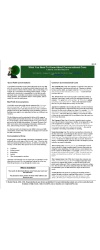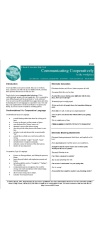There’s no argument that the use of questions is a critical part of give and take conversation, and questions are a great way to show you are interested in the other person. They are essential to the dialogue process.
However, poor use of questions, or overuse can have an effect opposite to what you intend. If you string together too many questions, the other person will tend to feel you are interrogating or trying to trick, particularly if you give no indication that you are actually listening to the answers. Use of too many questions can also give the impression that you are using the questions to control the conversation and what the other person can and cannot say.
Also, if you use questions in a tricky hidden agenda type way to express an opinion by trying to obscure your statement by phrasing it as a question, the other person will start to question your honesty and intentions. For example: “You couldn’t possibly believe that Joe is a good employee, could you?” is clearly a statement of opinion on your part, and not a sincere desire to get an answer so you’ll understand the other person.
Problems with the use of questions are more pronounced with one particular question type — the Why question, which has a tendency to be perceived as pressuring, since, for many people, it’s interpreted as a challenge — being asked to justify one’s opinion.






